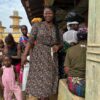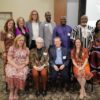RHCI board member Gary Johnson MD, MPH and his wife, Sandra, arrived in Tikonko in early May 2016. For 6 months they lived in the village, working to advance RHCI’s mission. While they have been in the USA recently, Gary will be leaving for Sierra Leone again on December 16, 2016, and plans to work there until mid-March 2017.
What an amazing opportunity and blessing to be able to take this amount of time, to do this kind of work! I am so thankful to my wife, Sandra, who has shared this opportunity with me. We dreamt, planned, prepared, went, worked, sweat, listened, made important connections, met many hundreds of new friends, alleviated some suffering, saved some lives, and saw people die of things they shouldn’t die from. Hunger, disease, injury, suffering, and death are all about in Tikonko Chiefdom. So are the things that bring joy and meaning to life such as God, loved ones, friendships, community, work that matters, and hope. It’s a very hard place, but all around me in Tikonko Chiefdom I see resilience and heroism.
This is critically important to understand, RHCI is building a system of care for pregnant women and children under 5 years of age in a rural chiefdom of West Africa. It is firmly rooted in the Sierra Leonean community, is being built to last, and it will not be dependent on staffing from the USA. With a system of care reaching from remote villages; to our birth waiting home, farm and staff in Tikonko; and to hospital care in Bo; this system will elevate the level of health, and the economy, in this rural chiefdom. Women are at the center of not only their families, but also the economy (farming) in this community. Dead women don’t care for children, and they are not productive. I said that rather bluntly, because it is a very real thing in Sierra Leone. It’s a lethal place to have a baby, or to be a child.
All aspects of the RHCI program are either in place and functioning, or are literally taking physical shape and form before our eyes. This is a thrilling time as we see a decades-old dream of a young girl (Alice Karpeh) materialize. This is an amazing story, and it is such a privilege to be part of it. It’s a story of the power of one, and an example of what a dedicated group of people can accomplish in this world.
What are the big take aways for me so far?
First, this is all about relationships and community, and always has been. From the Paramount Chief and his wife Beatrice, to my neighbors, to folks out in remote villages, I am told what a difference RHCI’s effort is making, and that the program is well-designed to serve the people of Tikonko Chiefdom. We continue to fine tune what we are doing based on daily feedback from the community we are serving. Such is the advantage of being on the ground on a continual basis over a long period of time.
Second, and this is very important, is seeing first-hand what a great difference can be made with even modest investments in this part of the world. Sandra and I frequently save dying children for $50. We regularly save the limbs and lives of adults for the same, or much less. Health catastrophes are prevented for pennies when good prenatal care and immunizations are made available in remote villages. The lives of young, productive women are saved for the cost of a ride to a hospital. This is what happens when resources become available, and the barriers between people and those resources are eliminated. This is what RHCI is doing. Everyone agrees (the United Nations, the World Health Organization, the Government of Sierra Leone, etc …) that if you want to have the greatest impact for each dollar spent on preventing unnecessary death and suffering in the developing world, invest in pregnant women and under 5 children. I agree. I see it every day.
Thirdly, I see the power of collaboration and partnerships every day. RHCI’s approach all along has been to find the people and organizations that can help us accomplish our mission. Examples abound, and include our partnership with the Tikonko government Community Health Clinic (CHC) to bring mobile outreach services to remote villages on a weekly basis. These are wildly popular, and reduce significantly the barriers to receiving prenatal care, immunizations and acute care for women and children who live far from the government clinic. We support the effort financially, paying for all the costs associated with it including the wages of the government clinic nurses who participate, paying for all the medicines used, and supplying a motorbike and driver to the effort. As I attend these clinics, I take the time to visit the village chief and women leaders. They gush over what a difference these clinics make in the lives of their people. The clinics serve not only the four rural villages we travel to, but also even more remote villages that radiate out from them via rough track, or even foot path and across rivers.


